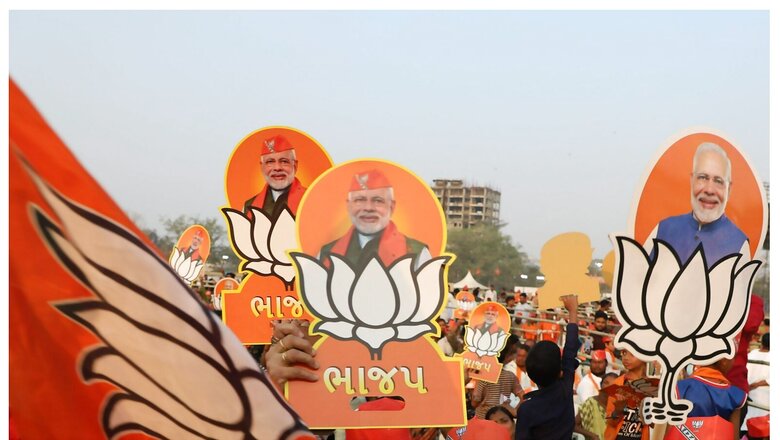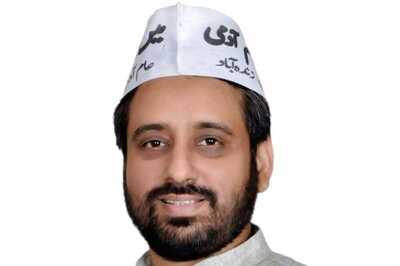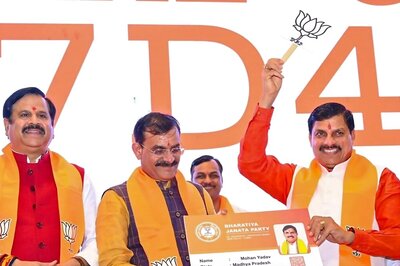
views
Now that the heat and dust, and the jubilation and the setbacks of the recent elections in Gujarat, Himachal Pradesh and the municipal elections in Delhi (MCD), have settled down, it is time to do a calm stocktaking.
The Bharatiya Janata Party (BJP) scored a massive victory in Gujarat, surpassing all previous records, and full credit must be given to it for this remarkable performance. However, the result was not exactly a surprise. Both Narendra Modi and Amit Shah hail from Gujarat, and especially the Prime Minister enjoys unprecedented popularity. Moreover, the BJP almost got a walk over, since the Congress campaign was in tatters, and the Opposition vote was further divided by the over-hyped entry of the Aam Aadmi Party (AAP).
Himachal Pradesh (HP), from the very beginning, was for the Congress to win. There was widespread resentment against the BJP on the revoking of the Old Pension Scheme, the introduction of the Agniveer recruitment (of especial interest in HP because of the large numbers of the young who join the armed forces), and of the sub-par charisma of the chief minister, Jai Ram Thakur. In any case, in HP the usual pattern is for the BJP and Congress to alternate in power, and this time it was the turn of the Congress to rule the state.
What is surprising, however, was that the Congress — accustomed by now to snatching defeat from the jaws of victory — almost lost the elections. Although its seats were substantially higher than that of the BJP, the vote percentage of both parties was almost equal. There is only one reason why the BJP lost the elections, and that is the unfamiliar phenomena of a plethora of rebel candidates. This is a new warning sign for the BJP. One of the inevitable consequences of long stints in power is the growth of vaulting ambitions of local leaders, who are no longer amenable to the discipline of a cadre-based party like the BJP. A viral video of PM Modi pleading with a rebel candidate to step down — and his refusing to do so — should make the BJP worry about what could happen in future in other states as well.
The victory of the AAP in the MCD elections in Delhi has several lessons, especially for the BJP. For months before the elections, the BJP carried out a relentless campaign against the AAP, on charges of corruption. Without going into the merits of the allegations, which are under investigation, the nature of the attack was ferocious. Every means was employed to tarnish the reputation of the AAP, from daily press conferences, sting operations, raids and searches, and arrests of its leaders. But the AAP still won, albeit with a lesser margin than expected.
This makes it absolutely clear that ordinary voters will remain loyal to work on the ground that improves the quality of their lives. Although opinions differ, there is general consensus that the AAP has improved services in the capital for ordinary and poorer people through better schools, mohalla clinics, and water and electricity services. On the other hand, there is clear evidence that the MCD, ruled by the BJP for 15 years, was inefficient and corrupt. The BJP pulled out all its big guns to influence the Delhi voter; it put to full use its organisational strengths; and, reportedly, spent considerable money into its campaign. And yet, it lost. The inference is inescapable: at the local level, if an Opposition party has won the support of the people, and has a credible face, no amount of calumny against it will cut much ice with the voter.
What are the implications of these elections on national politics? First, it would be a great mistake to believe that defeating the BJP in HP and in the Delhi-MCD elections is a sign that the BJP can be defeated in the national parliamentary elections in 2024. At the national level, there is, as yet, no leader with the popularity and near pan-Indian following of Narendra Modi. Nor does any other party have the all-India organisational strength of the BJP. And, finally, no other party has a national narrative — Hindutva, hyper-nationalism, and welfarism — that the BJP has.
Second, these elections show that the BJP is not invincible. In state and local elections, it can — and has been — defeated, perhaps as many times as it has won. A strong local leader, with regional support, can trump the BJP, notwithstanding the personal popularity of Modi. It is significant that in bypolls in other states during this round, the BJP lost 5 out of 7 seats that were in the contest. Further, the infighting within the BJP, as HP showed, is a new worry for the party.
Third, the Opposition has much to learn. Its leaders refuse to understand that unless they hang together, they will all hang separately. A divided Opposition helps the BJP. In Gujarat, the Congress and the AAP were fighting each other, rather than jointly fighting the BJP. In Himachal, the AAP was splitting the votes of the Congress instead of putting up a joint front against the BJP. And, in Delhi, the BJP had again the advantage of the Congress and AAP dividing the Opposition vote.
There are legitimate discontents of the ordinary citizen — unemployment, price rise, authoritarianism — that the Opposition can harness to build a national narrative. But the Opposition has made working in silos into a fine art, and the BJP is the national beneficiary.
The author is a former diplomat, an author and a politician. The views expressed in this article are those of the author and do not represent the stand of this publication.
Read all the Latest Opinions here


















Comments
0 comment